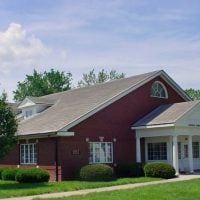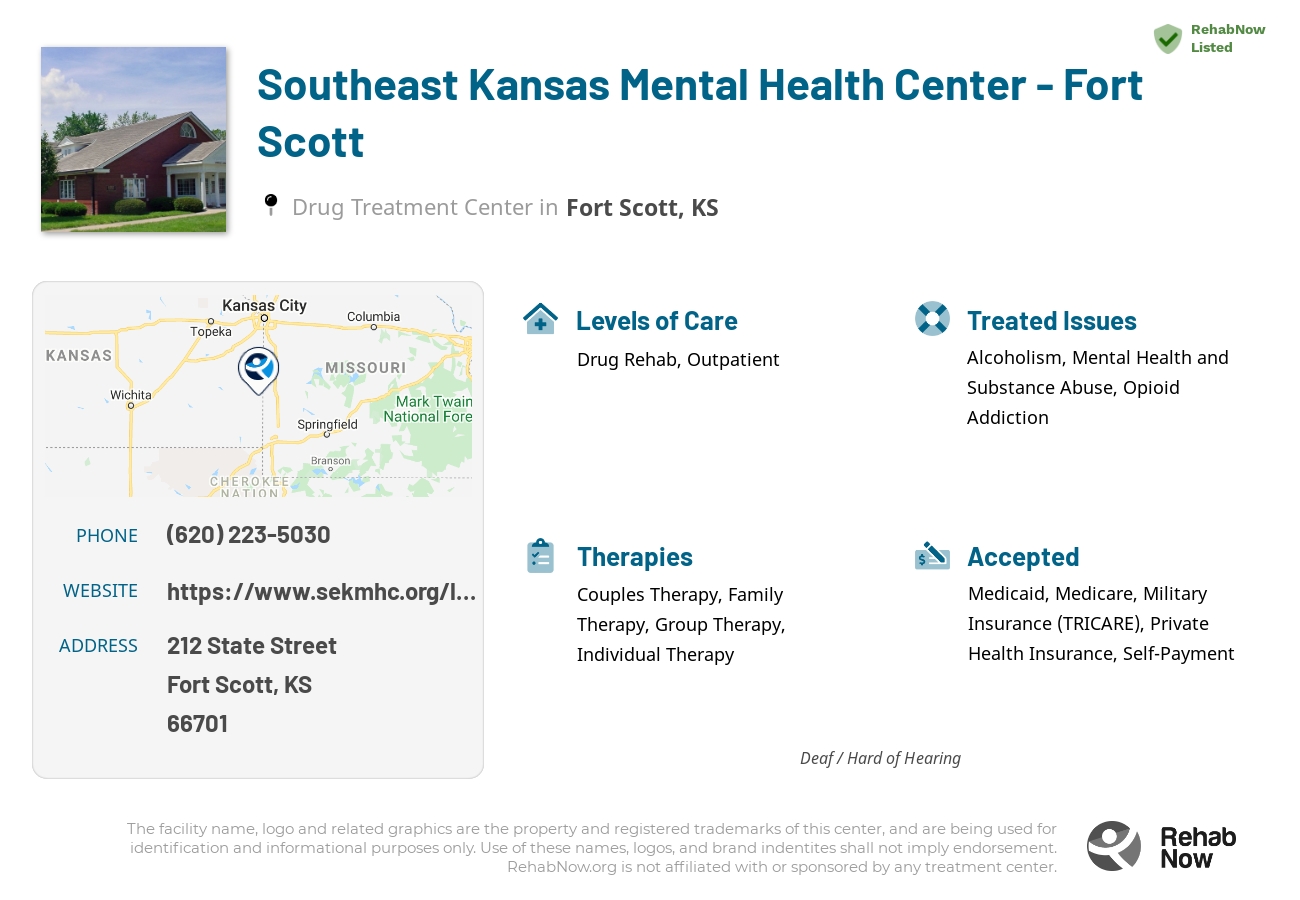Southeast Kansas Mental Health Center - Fort Scott
Drug Rehab Center in Fort Scott, Kansas
Southeast Kansas Mental Health Center - Fort Scott provides a comprehensive drug rehab program, featuring evidence-based treatments such as cognitive-behavioral and motivational interviewing therapies, relapse prevention, and medication-assisted treatment when appropriate, to support individuals in their journey towards sobriety and recovery.
About This Kansas Facility
Southeast Kansas Mental Health Center - Fort Scott is a drug treatment facility located in Fort Scott, Kansas. This center specializes in providing support and treatment for individuals struggling with alcoholism, opioid addiction, dual diagnosis, and drug addiction. They offer various levels of care, including outpatient services, to accommodate different needs and circumstances. Southeast Kansas Mental Health Center - Fort Scott accepts private health insurance, making their services accessible to those with coverage. This facility is affiliated with Southeast Kansas Mental Health Center, ensuring that clients receive comprehensive care in a supportive and professional environment.
At Southeast Kansas Mental Health Center - Fort Scott, individuals seeking to overcome addiction can access a range of services and treatment methods. These include drug rehab programs, where clients can receive comprehensive support and guidance in their journey toward sobriety. The facility also offers outpatient services, allowing individuals to continue their treatment while maintaining their daily responsibilities. Throughout the treatment process, Southeast Kansas Mental Health Center - Fort Scott focuses on addressing the specific needs of each individual, taking into account any co-occurring mental health conditions through dual diagnosis treatment. Their approach emphasizes a holistic and personalized approach to addiction recovery, aiming to support clients in achieving long-term sobriety.
Genders
Ages
Modality
Additional
Conditions and Issues Treated
Many people who struggle with opioid addiction need to attend specific programs like methadone , Suboxone or Vivitrol clinics.
These types of programs will provide the patient with legal, prescription medications that can help them overcome their cravings for illegal opioids like heroin or fentanyl . If the patient has a chronic condition like Hepatitis C, they must undergo treatment before they can begin taking these medications.
Levels of Care Offered at Southeast Kansas Mental Health Center - Fort Scott
This center offers a variety of custom treatment tailored to individual recovery. Currently available are Drug Rehab, Outpatient, with additional therapies available as listed below.
Outpatient treatment programs provide drug and alcohol addiction treatment through individual sessions with a counselor, group therapy, 12-step meetings, and other activities to help individuals gain sober living skills. Most programs are designed for those individuals who have completed a medically supervised detoxification program and provide opportunities for clients to begin the process of early recovery.
Outpatient programs also offer a level of medical support as needed and psychological backing through therapy. Clients are encouraged to live at home, though there may be some flexibility regarding this requirement based on the circumstances and needs of each patient.
Outpatient treatment is perhaps the most common type of dual diagnosis program available. It does not pose a significant financial burden on patients. However, it is essential to note that outpatient treatment does not provide the support and supervision given in residential programs. Some addicts may need this level of support to maintain their sobriety.
Therapies & Programs
Therapy sessions focused on the individual addict can provide much-needed guidance as they work toward overcoming their addiction. These types of sessions typically involve guidance from a therapist, who will help addicts identify and process their feelings and cravings.
During these sessions, addicts may develop plans for coping with the triggers that typically lead to relapse and learn how to avoid those triggers during their recovery process.
If you are looking for drug recovery, couples therapy can be a great option. This type of therapy can help rebuild trust and joy in relationships that may have been damaged by addiction. It can also help reduce the dysfunctional behavior in a relationship that may trigger addiction. A patient’s partner will be involved in the process. They can also benefit from therapy, especially if they are trying to live with an addict.
The main goal of family therapy for drug addiction is to create an environment where communication can occur without judgment, hostility, or blame that often occurs within a family.
Family therapy is a type of group problem-solving that aims to improve communication and relationships between the patient, their family, and sometimes friends. The therapist is with the family as they learn to communicate with each other differently, especially with the addict when s/he is using.
The family can learn to reduce their enabling behavior or rally together and support each other during tough times. The patient also learns how to deal with their addiction and maintain sobriety while interacting with the family.
Different types of addiction treatment services are available. Within this article, group therapy is of interest due to its high success rate compared to individual therapy. Group therapy settings are beneficial because they allow recovering addicts to build a strong support network.
Benefits of group therapy are:
- Reduces feelings of isolation
- Immediate access to social support in the form of fellow addicts in recovery
- Lowers risk of relapse
- Increases rate of sobriety
- Builds coping skills that can be applied to everyday life
Cognitive Behavioral Therapy (CBT) is used by drug treatment centers to help addicts comprehend the causes of their substance abuse and the consequences that follow. Through CBT, clients learn to recognize and avoid high-risk situations and cope with challenging situations when they arise.
CBT treatment often includes a combination of individual therapy, group therapy, lectures, and other activities. The treatment’s goal is to help addicts gain self-control and maintain abstinence from drugs and alcohol over the long term so that an addict can get sober and lead a more productive life.
CBT is particularly effective in helping people overcome their drug problems, especially people whose drug abuse is motivated by self-defeating beliefs and emotions.
Payment Options Accepted
For specific insurance or payment methods please contact us.
Is your insurance accepted?
Ask an expert, call (888) 674-0062
Southeast Kansas Mental Health Center Associated Centers
Discover treatment facilities under the same provider.
Learn More About Southeast Kansas Mental Health Center Centers
Additional Details
Specifics, location, and helpful extra information.
Fort Scott, Kansas 66701 Phone Number(620) 223-5030 Meta DetailsUpdated November 25, 2023
Staff Verified
Patient Reviews
There are no reviews yet. Be the first one to write one.
Fort Scott, Kansas Addiction Information
About 42% of adults in Kansas have tried an illicit drug at some point in their lives. 12.4% of the state population uses illegal drugs and 4.5% abuse alcohol in a given year. 15.16% of all deaths in Kansas between 2008 and 2017 were caused by either drugs or alcohol.
The drug addiction problem in Fort Scott, Kansas is relatively minor. Only 2.1% of the population reported drug use. Between 2002 and 2016, the number of opioid-related deaths in Fort Scott nearly tripled, which is a terrible situation for society. In Fort Scott in 2016, most of the arrests were for methamphetamine or marijuana. The good news is that there are treatment options available.
Treatment in Nearby Cities
- Burlington, KS (61.7 mi.)
- Overland Park, KS (79.1 mi.)
- Colby, KS (359.5 mi.)
- Hillsboro, KS (140.6 mi.)
- Garden City, KS (336.7 mi.)
Centers near Southeast Kansas Mental Health Center - Fort Scott
The facility name, logo and brand are the property and registered trademarks of Southeast Kansas Mental Health Center - Fort Scott, and are being used for identification and informational purposes only. Use of these names, logos and brands shall not imply endorsement. RehabNow.org is not affiliated with or sponsored by Southeast Kansas Mental Health Center - Fort Scott.



